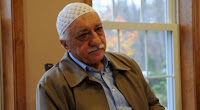 |
| PM Erdogan, Istanbul's Governor, Mayor and Chief of Police and Said Nursi's students attended to the funeral along with thousands. |
He was buried in İstanbul's Eyüp Sultan Cemetery following a funeral ceremony at the Fatih Mosque on the same day.
The ceremony was attended by Prime Minister Recep Tayyip Erdoğan, EU Minister Egemen Bağış, İstanbul Governor Avni Mutlu, İstanbul Mayor Kadir Topbaş, İstanbul Police Department head Hüseyin Çapkın, Nursi's students Mehmet Fırıncı, Hüsnü Bayram, Abdülkadir Badıllı ve Abdullah Yeğin. The ceremony was led by Religious Affairs Directorate President Mehmet Görmez.
Erdoğan made a speech following the ceremony, saying that Sungur struggled and endured much trouble in order to leave people with a better understanding of Islam.
Sungur (83) had been receiving treatment for his diabetes and brain embolism at Fatih University Hospital since Sept. 26 when he died there on Saturday. Doctors said the cause of his death was multi-organ failure.
Görmez, who visited Sungur just 15 minutes before his death, said that we have lost a prominent figure who has made great contributions to discussing and promoting the true concepts of Islam. “Divine truths cannot remain through mortal figures for eternity; but they can remain for eternity through the services of mortal figures. I hope his services will remain impactful forever,” he noted.
Sungur's friend and another student of Nursi's, Fırıncı, has also expressed his grief over his friend's death. “Brother Sungur was a loyal hero. It is impossible to say it in words. He was one of the lights of Islam. Bediüzzaman once said about him that he was supposed to live by the [Risale-i] Nur and that Sungur's life will follow the same path as Nursi's life. Nursi used to tell us about brother Sungur all the time. He indeed lived almost in the same way as Nursi for 50 years,” he noted.
Meanwhile, Üsküdar University Rector Professor Nevzat Tarhan said that Sungur had difficulty remembering things due to his old age. “He would even confuse prayer times. But whenever he would start reciting Quranic verses, it was as if he had no problem with his memory whatsoever. To our surprise, he was telling us about parts of Risale-i Nur in very a detailed way.”
 |
| Fethullah Gulen |
Sungur was born on Sept. 29, 1929 in Safranbolu, a district of the northern province of Karabük. While he was teaching at schools at the age of 17, he started reading the Risale-i Nur collection, written by Said Nursi. As he said so himself, he realized that Nursi's books were presenting him with totally new perspectives, which made him decide to visit Nursi. He did so in 1947 and then stayed with Nursi to serve him for a while. After that, he never stopped promoting Nursi's ideas and books as well as adopting them as guides for his life. Nursi called him the “Hero of [Risale-i] Nur.”
Published on Sunday's Zaman, 02 December 2012, Sunday
